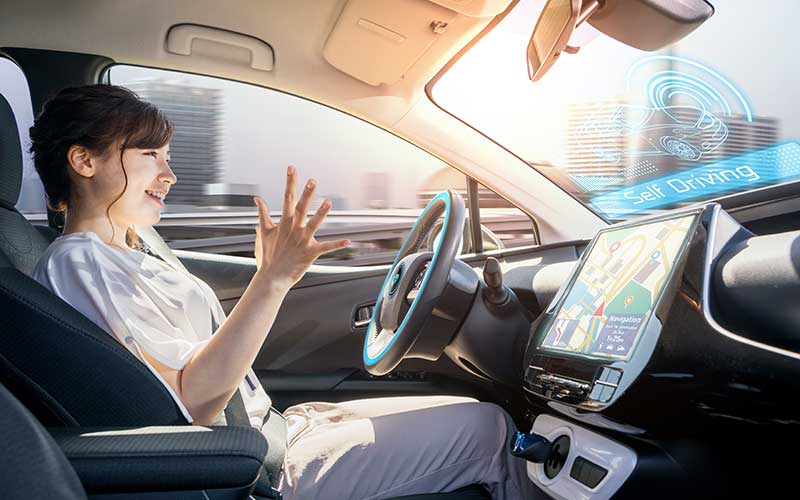
Self-driving car makers paint an idyllic picture of the future, but without proactive policies, the reality won't match up to their promises. Photo: metamorworks via Shutterstock
The makers of self-driving cars promise a blissful future for car commuters. Soon, they claim, we’ll be able to zip along traffic-free roads, letting our cars do the driving while we read, watch Netflix, or text all we want. We’ll no longer rail at traffic jams, our air will be cleaner, and all those parking spaces and garages will be freed up for better uses.
When you dig past the marketing hype, however, you hit some pretty serious reality roadblocks (and not just the safety concerns, which became all too real following the tragic death a pedestrian in Arizona earlier this year). The happy future painted by car developers could indeed materialize, but only if policymakers take steps now to ensure that our transportation future is autonomous and electric – and that most self-driving cars are shared rather than privately owned.
Without proactive policies, we face a future with even heavier traffic congestion, dirtier air, and more climate-damaging emissions – on top of losses in revenue streams on which our cities, towns, and state rely.
These are the findings of a first-of-its-kind report just released by Conservation Law Foundation on the fiscal and economic impacts of self-driving vehicles in Massachusetts.
Without Regulation, Self-Driving Cars Could Make Traffic and Air Pollution Worse
Self-driving cars are already being tested on the streets of Boston’s Seaport District. And, just recently, 15 cities and towns announced an agreement with the State to ease and expand testing on more roads across the Commonwealth.
In developing our report, we looked at fiscal impacts for cities and towns, from parking-related revenues to local road maintenance. We also assessed impacts on the state budget, including the gas tax, sales and use tax, toll receipts, and moving violations. Finally, we analyzed the economic implications for the Commonwealth as a whole, including congestion, safety, greenhouse gases, and air pollution.
Here’s the bad news: If we introduce autonomous vehicles into the status quo – that is, if self-driving cars are gasoline-powered and privately owned like most cars today – then we face more traffic and dirtier air than we breathe today. (Think about how self-driving cars never have to park because they can keep circling the block.) In fact, our analysis shows that, by 2050, when we expect our entire fleet to have transitioned to 100 percent autonomous vehicles, Massachusetts alone would face:
- $5.4 billion in additional costs related to sitting in traffic,
- $380 million worth of additional greenhouse gas pollution, and
- $300 million more in local and regional air pollution costs per year.
Not a picture you’d want to paint for a car commercial.
But there’s good news, too: If we buck the status quo, and the self-driving fleet is entirely electric vehicles used for ride pooling – like Lyft Line, Waze Carpool, or Uber Pool rather than privately owned vehicles and ride-hailing, such as UberX – Massachusetts can save:
- as much as $4 billion in incremental congestion costs,
- $1 billion in reduced greenhouse gas emissions, and
- $845 million in air pollution savings.
But we are kidding ourselves to think that this “good news” scenario will become a reality just by introducing the new technology and letting it run its course.
We Can Get Ahead of This Technology Revolution with Smart Policies Now
As I write this, self-driving vehicles are being tested both on gas-fired and electric engines. Car makers plan to sell them to private owners as well as rideshare companies.
At the same time, a modest number of electric vehicles have been sold in the Commonwealth to date, and ride-pooling (rather than ride-hailing) makes up only a small amount of trips on Uber, Lyft, and similar ride-sharing services.
Unless Massachusetts (and every New England state) puts smart policies in place now, self-driving vehicles are likely to follow the status quo scenario – and that will only hurt our budgets and quality of life. These policies should ensure that the fleet of self-driving vehicles is electric and ride pooling, and should account for changes to how cities, towns, and states raise automobile-related revenue (the gas tax, for example, will disappear when all of our cars are electric).
Self-driving cars have tremendous potential to change the way we live for the better. At a time when our changing climate urgently demands that we cut carbon pollution from transportation, why wouldn’t we do everything we can now to ensure that this technology revolution helps, rather than harms, our planet, our health, and our economic bottom line?
To learn more, read the report here.


